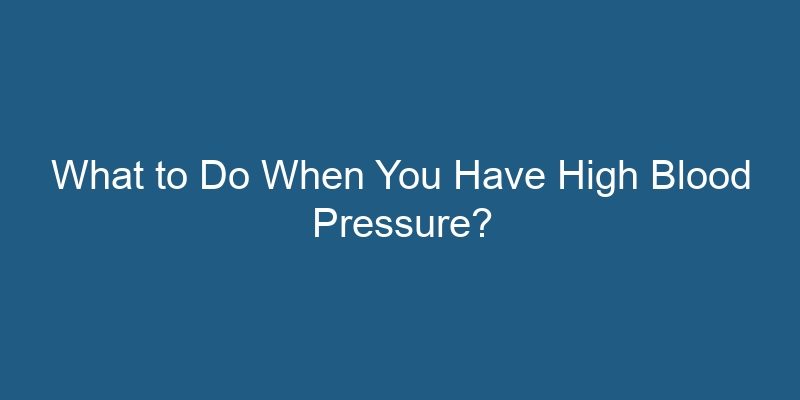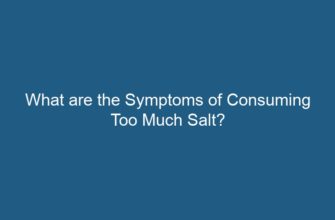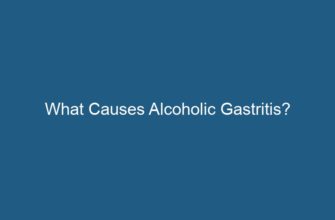High blood pressure, also known as hypertension, is a common health condition that affects millions of people worldwide. If left untreated, it can lead to serious complications such as heart disease, stroke, and kidney problems. Fortunately, there are several steps you can take to manage and reduce your blood pressure levels. In this article, we will explore various strategies and lifestyle changes that can help you maintain a healthy blood pressure.
- 1. Understand the Basics of Blood Pressure
- 1.1. Recognize the Risk Factors
- 1.2. Recognize the Symptoms
- 2. Lifestyle Changes to Manage High Blood Pressure
- 2.1. Eat a Balanced Diet
- 2.2. Maintain a Healthy Weight
- 2.3. Engage in Regular Physical Activity
- 2.4. Limit Alcohol Consumption
- 2.5. Quit Smoking
- 2.6. Manage Stress
- 3. Medications and Medical Interventions
- 3.1. Medications for High Blood Pressure
- 3.2. Other Medical Interventions
- FAQs (Frequently Asked Questions)
- Q1: Can stress cause high blood pressure?
- Q2: Is there a specific diet for high blood pressure?
- Q3: Can I stop taking my blood pressure medication if my blood pressure is under control?
- Q4: Can I prevent high blood pressure if it runs in my family?
- Q5: Can certain medications increase blood pressure?
- Q6: Can high blood pressure be cured?
- Conclusion
1. Understand the Basics of Blood Pressure
Before we dive into the ways to manage high blood pressure, it’s important to have a clear understanding of what blood pressure is and how it is measured. Blood pressure is the force exerted by the blood against the walls of the arteries as the heart pumps it around the body. It is typically measured using two numbers: systolic pressure (the top number) and diastolic pressure (the bottom number). Normal blood pressure is considered to be around 120/80 mmHg.
1.1. Recognize the Risk Factors
High blood pressure can be caused by various factors, including genetics, age, lifestyle choices, and underlying medical conditions. Some common risk factors for hypertension include:
- Family history of high blood pressure
- Being overweight or obese
- Lack of physical activity
- Unhealthy diet high in sodium and low in potassium
- Smoking
- Excessive alcohol consumption
- Stress
- Chronic conditions such as diabetes and kidney disease
1.2. Recognize the Symptoms
High blood pressure is often referred to as a “silent killer” because it usually doesn’t cause noticeable symptoms until it reaches dangerously high levels. However, some individuals may experience symptoms such as:
- Headaches
- Dizziness
- Shortness of breath
- Chest pain
- Visual changes
- Fatigue
It’s important to note that these symptoms can also be associated with other health conditions, so it’s essential to consult a healthcare professional for an accurate diagnosis.
2. Lifestyle Changes to Manage High Blood Pressure
Adopting a healthy lifestyle is one of the most effective ways to manage high blood pressure. Here are some key lifestyle changes that can make a significant impact:
2.1. Eat a Balanced Diet
A healthy diet plays a crucial role in managing blood pressure. The Dietary Approaches to Stop Hypertension (DASH) diet is often recommended for individuals with hypertension. It emphasizes fruits, vegetables, whole grains, lean proteins, and low-fat dairy products while limiting sodium, saturated fats, and added sugars.
Some key dietary recommendations to lower blood pressure include:
- Reducing sodium intake to less than 2,300 milligrams per day (ideally less than 1,500 milligrams)
- Incorporating potassium-rich foods such as bananas, spinach, and sweet potatoes
- Choosing lean proteins like poultry, fish, and legumes instead of fatty meats
- Limiting processed and packaged foods, which are often high in sodium
2.2. Maintain a Healthy Weight
Being overweight or obese increases the risk of developing high blood pressure. Losing weight and maintaining a healthy weight can help lower blood pressure levels. Aim to achieve and maintain a body mass index (BMI) within the normal range (18.5-24.9).
To achieve weight loss, it’s vital to combine a balanced diet with regular physical activity. Consult a healthcare professional or a registered dietitian for personalized guidance and support.
2.3. Engage in Regular Physical Activity
Physical activity is essential for maintaining overall health and managing blood pressure. Aim for at least 150 minutes of moderate-intensity aerobic exercise or 75 minutes of vigorous-intensity exercise per week. Some examples of aerobic exercises include brisk walking, jogging, cycling, and swimming. Additionally, strength training exercises at least twice a week can help strengthen your heart and lower blood pressure.
2.4. Limit Alcohol Consumption
Excessive alcohol consumption can raise blood pressure levels and contribute to other health problems. If you choose to drink alcohol, do so in moderation. The American Heart Association recommends a maximum of one drink per day for women and up to two drinks per day for men.
2.5. Quit Smoking
Smoking not only damages your lungs but also increases your risk of developing high blood pressure and heart disease. If you smoke, quitting is one of the best things you can do for your health. Seek support from healthcare professionals, support groups, or smoking cessation programs to increase your chances of success.
2.6. Manage Stress
Chronic stress can contribute to high blood pressure. Finding healthy ways to manage stress is crucial for maintaining overall well-being. Some effective stress management techniques include:
- Regular exercise
- Meditation and deep breathing exercises
- Yoga or tai chi
- Engaging in hobbies and activities you enjoy
- Getting enough sleep
3. Medications and Medical Interventions
In some cases, lifestyle changes alone may not be sufficient to control high blood pressure. In such situations, healthcare professionals may recommend medications or other medical interventions. It’s important to note that medication options and treatment plans may vary depending on individual circumstances.
3.1. Medications for High Blood Pressure
Various types of medications are available to treat high blood pressure. These medications work in different ways to lower blood pressure levels. Some common classes of antihypertensive medications include:
| Medication Class | Mechanism of Action |
|---|---|
| Diuretics | Increase urine production, reducing fluid volume and blood pressure |
| Beta-blockers | Reduce heart rate and the force of heart contractions, lowering blood pressure |
| ACE inhibitors | Block the production of angiotensin II, a hormone that constricts blood vessels |
| Calcium channel blockers | Relax blood vessels and reduce the workload on the heart |
| Angiotensin II receptor blockers (ARBs) | Block the action of angiotensin II, preventing blood vessel constriction |
These medications are typically prescribed by healthcare professionals and should be taken as directed. It’s crucial to follow up regularly with your healthcare provider to monitor your blood pressure and adjust medications if necessary.
3.2. Other Medical Interventions
In some cases, medical interventions may be required to manage high blood pressure. These interventions may include:
- Renal denervation: A procedure that uses radiofrequency energy to disrupt nerve signals to the kidneys, reducing blood pressure
- Bariatric surgery: Weight loss surgery that can help individuals with obesity-related hypertension
- Continuous positive airway pressure (CPAP): A treatment for sleep apnea, a condition associated with high blood pressure
FAQs (Frequently Asked Questions)
Q1: Can stress cause high blood pressure?
A1: Yes, chronic stress can contribute to high blood pressure. When you’re under stress, your body releases stress hormones that can temporarily increase blood pressure. Additionally, stress may lead to unhealthy coping mechanisms such as overeating, smoking, or excessive alcohol consumption, which can further raise blood pressure levels.
Q2: Is there a specific diet for high blood pressure?
A2: The DASH diet is often recommended for individuals with high blood pressure. It emphasizes fruits, vegetables, whole grains, lean proteins, and low-fat dairy products while limiting sodium, saturated fats, and added sugars. Following this diet can help lower blood pressure and improve overall cardiovascular health.
Q3: Can I stop taking my blood pressure medication if my blood pressure is under control?
A3: It’s essential to consult your healthcare provider before making any changes to your medication regimen. Stopping or adjusting your medication without medical guidance can cause your blood pressure to rise again. Your healthcare provider will monitor your blood pressure and determine the appropriate course of action.
Q4: Can I prevent high blood pressure if it runs in my family?
A4: While you cannot change your genetics, adopting a healthy lifestyle can help lower your risk of developing high blood pressure, even if it runs in your family. By maintaining a healthy weight, eating a balanced diet, exercising regularly, managing stress, and avoiding smoking and excessive alcohol consumption, you can significantly reduce your chances of developing hypertension.
Q5: Can certain medications increase blood pressure?
A5: Yes, certain medications, such as nonsteroidal anti-inflammatory drugs (NSAIDs), birth control pills, decongestants, and certain antidepressants, can raise blood pressure levels. It’s important to inform your healthcare provider about all the medications you are taking, including over-the-counter drugs, to ensure they are safe for individuals with high blood pressure.
Q6: Can high blood pressure be cured?
A6: While high blood pressure cannot be cured, it can be effectively managed and controlled through lifestyle changes and, if necessary, medication. By adopting a healthy lifestyle and working closely with your healthcare provider, you can keep your blood pressure within a healthy range and reduce the risk of complications.
Conclusion
High blood pressure is a serious health condition that requires proactive management. By making lifestyle changes, such as adopting a healthy diet, maintaining a healthy weight, engaging in regular physical activity, limiting alcohol consumption, quitting smoking, and managing stress, you can significantly lower your blood pressure levels. In some cases, medications or other medical interventions may be necessary. Remember to consult your healthcare provider for personalized advice and regular monitoring of your blood pressure. With proper management, you can reduce the risk of complications and lead a healthier life.










